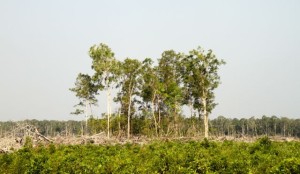(Merauke, Sept 2013) Kehadiran perusahaan perkebunan tebu Rajawali Group di Kampung Domande masih kontroversial. Masyarakat Domande sudah berkali-kali melakukan melakukan pemasangan palang secara adat untuk menghentikan aktivitas perusahaan.
Pada akhir Mei 2013, masyarakat Domande membuat surat yang memuat protes dan keluhan keberadaan perusahaan Rajawali, bahwa perusahaan banyak janji yang belum terealisasikan, perusahaan melanggar karena melakukan aktifitas melewati batas areal yang disepakati, masyarakat meminta ganti harga kayu yang sudah ditebang sebesar Rp. 15 miliar. Perusahaan negosiasi dan berjanji akan menanggapi tuntutan warga asalkan palang adat dilepas. Tetapi masih ada saja pelanggaran.
Salah satu keluhan masyarakat Domande adalah pembabatan hutan keramat di daerah Kali Ga’ul. Perusahaan membabat hutan sekitar tempat keramat yang mana terdapat kuburan leluhur Orang Malind. Padahal menurut rekomendasi ketentuan pemerintah dan masyarakat justeru tempat-tempat keramat tersebut harus dilindungi dan dienclave.
“Perusahaan semestinya tidak membabat hutan keramat ini dan mengengclave sedikitnya 500 meter disekeliling hutan tersebut dilindungi, tetapi yang terjadi perusahaan hanya menyisakan beberapa pohon disekitar lokasi kuburan keramat”, kata Hubertus Kaize, tokoh pemuda asal Domande. Perusahaan juga telah menggusur kawasan hutan keramat di daerah Sanggayas dan mendapat denda dari warga Domande.
Sudah semenjak tahun 2012, perusahaan Rajawali sangat aktif membuka hutan di wilayah Domande. Saat ini sudah ada jalan rintisan tanah sejauh kurang lebih 15 kilometer dari ujung Kampung Domande hingga ke lokasi yang direncanakan untuk pembangunan pabrik dan perkebunan tebu. Perusahaan juga telah membuat kebun tebu percontohan di daerah Kali Ga’ul.
Menurut Hubertus Kaize, perusahaan cenderung tidak mengindahkan pandangan masyarakat yang melarang penggunaan tempat penting, tempat keramat dan daerah mata pencaharian masyarakat. Misalnya daerah sekitar Selisadih, rawa Duhibob dan rawa Mege, yang merupakan sumber mata pencaharian masyarakat, tetapi tetap saja digusur perusahaan untuk perkebunan tebu, jalan dan lokasi pabrik.
Tuntutan warga untuk ganti rugi harga kayu yang ditebang dan ditimbun perusahaan juga belum direalisasikan. Pemerintah juga tidak pernah menjelaskan izin perusahaan untuk membabat hutan yang semestinya menggunakan Izin Pemanfaatan Kayu. (Ank, Sept 2013)
Sumber: Pusaka http://pusaka.or.id/perusahaan-tebu-rajawali-babat-hutan-keramat/
[Berita lain tentang Rajawali: Empat pekerja harian lepas di perkebunan kelapa sawit Rajawali di Kabupaten Keerom (dekat Jayapura) sudah dipecat oleh perusahaan karena mereka protes pekerjaan mereka bertambah berat dua kali lipat dengan upah tetap. Mereka sudah sejak tahun 2010 kerja untuk Rajawali. Membaca berita lengkap dari Mongabay Indonesia: http://www.mongabay.co.id/2013/09/25/derita-buruh-sawit-rajawali-group-di-papua-protes-beban-kerja-berbuah-pemecatan/ ]

